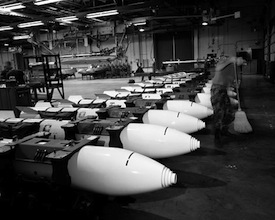Administration May Speed Up Dismantlement of Older Nuclear Weapons
March 2, 2010
Featured Image
We are happy to serve you a daily summary of the day's top nuclear policy stories each morning, with excerpts from the stories in bullet form.
Stories we're following today:
Obama Team Might Speed Up Disassembly of Older Nuclear Warheads - Global Security Newswire [link]
- In a new initiative, the United States is likely to step up the rate at which it dismantles older nuclear warheads no longer deployed in the arsenal.
- Pending a decision by President Barack Obama on the matter, Pentagon leaders are seeking to send a portion of hedge-force weapons into the queue for dismantling, according to sources and experts.
- As it stands, U.S. plans to eliminate the existing backlog of roughly 4,500 retired warheads by 2022 would require that Pantex ramp up from an estimated 250 weapons this year to approximately 400 annually by 2012, said Hans Kristensen of the Federation of American Scientists.
- Absent a new initiative, indications are that the backlog will actually grow in the months and years to come, thanks to arms control reductions and other efforts.
- A key motivation has been to identify bold initiatives the White House could tout at the five-year review conference of the Nuclear Nonproliferation Treaty, to take place in New York City in May, sources and observers said.
Medvedev Hopes For START Successor Deal Soon - Reuters [link]
- "In essence, we have reached the final part of negotiations," Medvedev said. "I hope these negotiations will be finished in the very near future."
- The sides will resume negotiations on March 9 "with the aim of finalizing the future treaty and presenting it for signing by the presidents of Russia and the United States," the Russian Foreign Ministry said earlier on Monday.
- Sarkozy said Mevedev and Obama are going "in the right direction and it's extremely positive."
Nuclear Security Plan Requires Additional Leadership, Funds, Experts Say - Global Security Newswire [link]
- Sustained executive leadership and more money in future budget cycles will be needed to even attempt to meet U.S. President Barack Obama's goal of securing the world's loose nuclear material within four years, according to a pair of nuclear experts.
- "If you're going to secure all vulnerable nuclear materials around the globe ... then you need to have a budget which is sized to do that, even if it means you don't have all the agreements in place that you need right now or while the Congress is considering" the White House request, said Kenneth Luongo, President of the Partnership for Global Security.
- "I think Congress can help if it chooses to do so," said Harvard's Matthew Bunn. Still, "the biggest things that need to be done are creative and consistent executive branch leadership and that's hard to legislate."
Nuke Audits Uncover Shortfalls at 5 Bases - Air Force Times[link]
- At least five Air Force bases have made mistakes in how they inventory, store or control access to nuclear weapons-related material, according to an internal investigation.
- The Air Force Audit Agency uncovered the shortfalls in July while conducting inspections prompted by the March 2008 discovery that nuclear missile components had been mislabeled as helicopter parts and shipped from Hill Air Force Base, Utah, to Taiwan three years earlier.
- All the problems have been corrected, according to the audit agency. The findings, however, suggest problems with securing nuclear components could be more widespread than previously thought.
Changing the Nuclear Posture: Moving Smartly Without Leaping - Ivan Oelrich in FAS Strategic Security Blog [link]
- Most reports say that the NPR will reduce the role of nuclear weapons and, specifically, may reverse the Bush policy of targeting chemical and biological weapons with nuclear warheads so that nuclear weapons will be reserved only for nuclear threats. This is sometimes called a “sole-use” policy. The real question is whether the nuclear doctrine should move beyond a sole-use policy to a no-first-use policy.
- A no-first-use policy would be a dramatic shift from current doctrine… Such a major change in doctrine would allow similarly profound changes in the operation of our nuclear forces.
- The key point is to not discuss no-first-use as all-or-nothing. No-first-use will be radically different from today’s frightening standoff but we do not have to get there in one revolutionary move, there are stops along the way that allow us to reevaluate. The NPR simply has to take a large step in the right direction.



